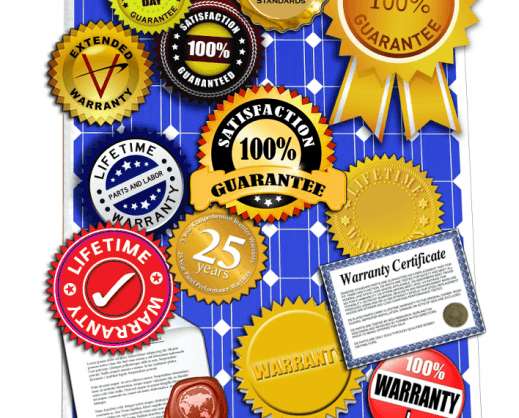This is the first in a series of posts about many of the glossed over aspects of solar energy. Ample time and attention have been devoted to solar PV training, large-scale installations, and even green incentives – all of which are incredibly important.
Far less covered, however, are the nuts and bolts of the industry – areas like solar contracting, PV kits, and the panels themselves.
Without a firm understanding in these areas, many homeowners and businesses fail to realize the ROIs they were promised before signing on the dotted line. And that’s a real shame, because at the end of the day, solar is an investment – not only in financial terms, but also in environmental ones as well.
So today, with this post, I wanted to announce an upcoming feature of Florida Solar One – side-by-side comparisons in which we test the warranty claims of many of the top solar manufacturers on the market.
But let me back up a bit.
What Is a Solar PV Warranty and Why Should You Care?
First, it is important to understand that solar panel warranties are slightly different from the standard warranties you’d receive from a new television or car – products that either work or don’t work.
You see, solar panels (all solar panels) deteriorate with time. It’s true.
It doesn’t matter how well your system performs on Day 1. Within 10 and 25 years, the total power output invariably goes down – regardless of the make and model.
This is why solar manufacturers usually tier their warranties, promising, for example:
- 97% power output in the first year
- 90% by year 10
- 80% by year 25
Understanding this tiered warranty system is important when selecting a new installation. You don’t simply want panels that last – you want panels that continue delivering optimal power output for as long as possible.
But there’s a problem with this tiered system. A few problems in fact:
- Manufacturers enjoy considerable leeway on the rates they get to promise. Yes, there are some independent verification bodies out there, but enforcement can be very difficult.
- Most tests are not under real-world conditions. Rather, they’re in laboratories under ideal conditions in which testers don’t have to factor in things like latitude, weather, time of day, and all of the other variables that influence system performance. So when a manufacturer claims 15% efficiency, this doesn’t necessarily reflect what your system will generate once installed on your rooftop.
- Most tests for solar panel output and performance can only verify the early years. Tests for 25-year output would have had to begin in 1988 to be 100% accurate today. Few independent labs have the resources to conduct tests on any one technology for that long.
Consequently, there is a lot of “misrepresentation” in the market – a theme that we’ll revisit again and again in this series.
Bringing Clarity and Cohesion to Solar PV Warranties
At Florida Solar One, we’ve decided to launch a new testing and verification process – a solar warranty rating if you will. Dubbed the “USSolar Real-World Solar PV Challenge.”
Taking some of the leading panels on the market, we’ll do side-by-side comparisons under real-world conditions. And not just real-world… we’re talking about Florida, the Caribbean, and Latin America. After all, tests conducted in Oregon or Oslo would yield very different results.
Under this rating system top performers will earn up to 5 bright suns, while those that underperform could earn 5 dark clouds.
Now admittedly, these tests won’t account for 10-year or 25-year warranties. After all, we couldn’t share those results until 2023 at the earliest. But they will tell you how well each of these panels actually performs – for real – not in a laboratory and not based on the unverified claims of the manufacturers.
All the compiled results will be published online right here at Florida Solar One. And on each product page, we’ll be sure to put the rating front and center so you can easily gauge whether or not a particular panel technology is even worth considering. Obviously, anything in our catalog that “underwhelms” will almost certainly be removed. Our goal is to promote only top performing panels.
So, stay tuned.


